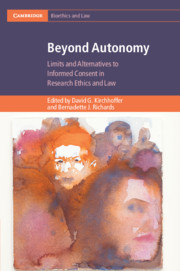Book contents
- Beyond Autonomy
- Cambridge Bioethics and Law
- Beyond Autonomy
- Copyright page
- Contents
- Tables
- Contributors
- Acknowledgements
- Introduction
- Part I Exploring Problems of Respect for Autonomy in Bioethics, Law and Society
- Part II The Search for Alternative or Complementary Concepts Surrounding Autonomy
- Part III Beyond Autonomy: Turning to the Community to Protect the Individual
- 9 Duties of Shared Membership in Research Ethics
- 10 Engaging Communities in Human Research in the Global South
- 11 Reducing Shared Vulnerabilities to Data Misuse
- Index
- Books in the Series
11 - Reducing Shared Vulnerabilities to Data Misuse
from Part III - Beyond Autonomy: Turning to the Community to Protect the Individual
Published online by Cambridge University Press: 20 September 2019
- Beyond Autonomy
- Cambridge Bioethics and Law
- Beyond Autonomy
- Copyright page
- Contents
- Tables
- Contributors
- Acknowledgements
- Introduction
- Part I Exploring Problems of Respect for Autonomy in Bioethics, Law and Society
- Part II The Search for Alternative or Complementary Concepts Surrounding Autonomy
- Part III Beyond Autonomy: Turning to the Community to Protect the Individual
- 9 Duties of Shared Membership in Research Ethics
- 10 Engaging Communities in Human Research in the Global South
- 11 Reducing Shared Vulnerabilities to Data Misuse
- Index
- Books in the Series
Summary
Clinical medicine is heavily reliant upon the results of high-quality research, conducted to exacting ethical standards. Efforts to ensure such standards include the development of national and international research ethics guidelines together with the establishment of review systems such as research ethics committees (RECs, also known as institutional review boards or IRBs). A major focus of these efforts has been on protecting the autonomy of participants, primarily through the process of detailed informed consent. Gaining well-informed consent from prospective participants limits the potential for individuals to be subjected unknowingly or unwillingly to experimentation and, when well done, supports individuals to make free choices about their research participation. However, informed consent is not a universal panacea as there are various ethical breaches in research against which informed consent is relatively powerless. My focus is on one such breach – that of data misuse.
- Type
- Chapter
- Information
- Beyond AutonomyLimits and Alternatives to Informed Consent in Research Ethics and Law, pp. 183 - 199Publisher: Cambridge University PressPrint publication year: 2019

